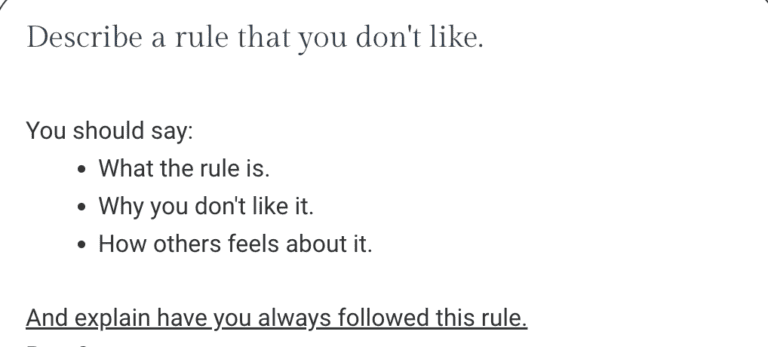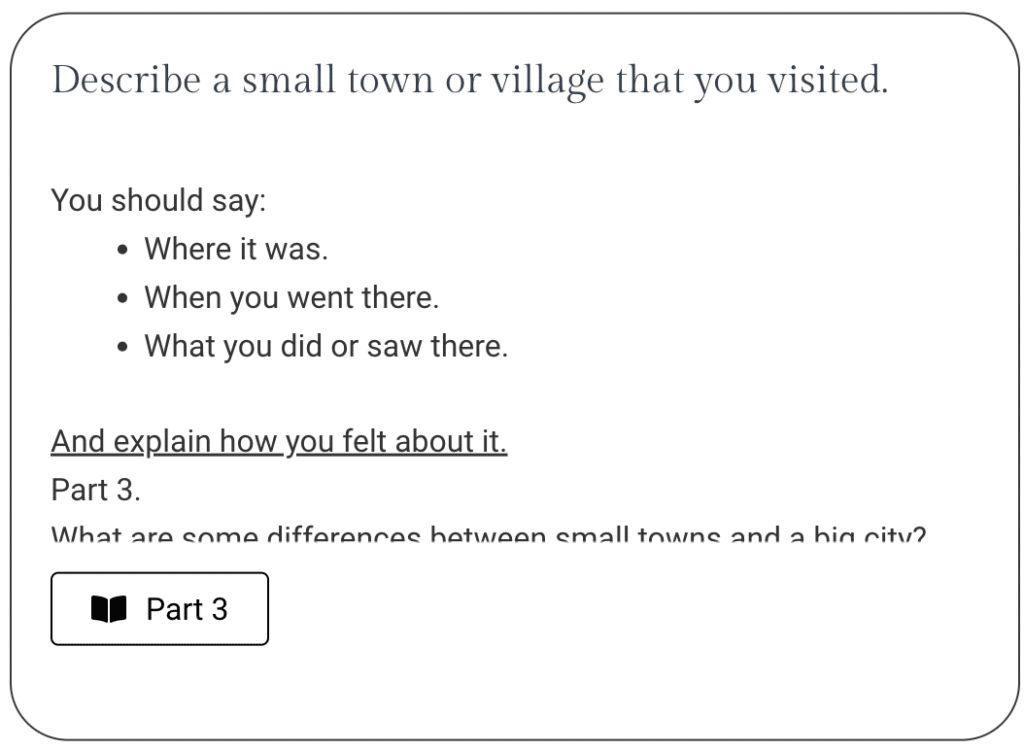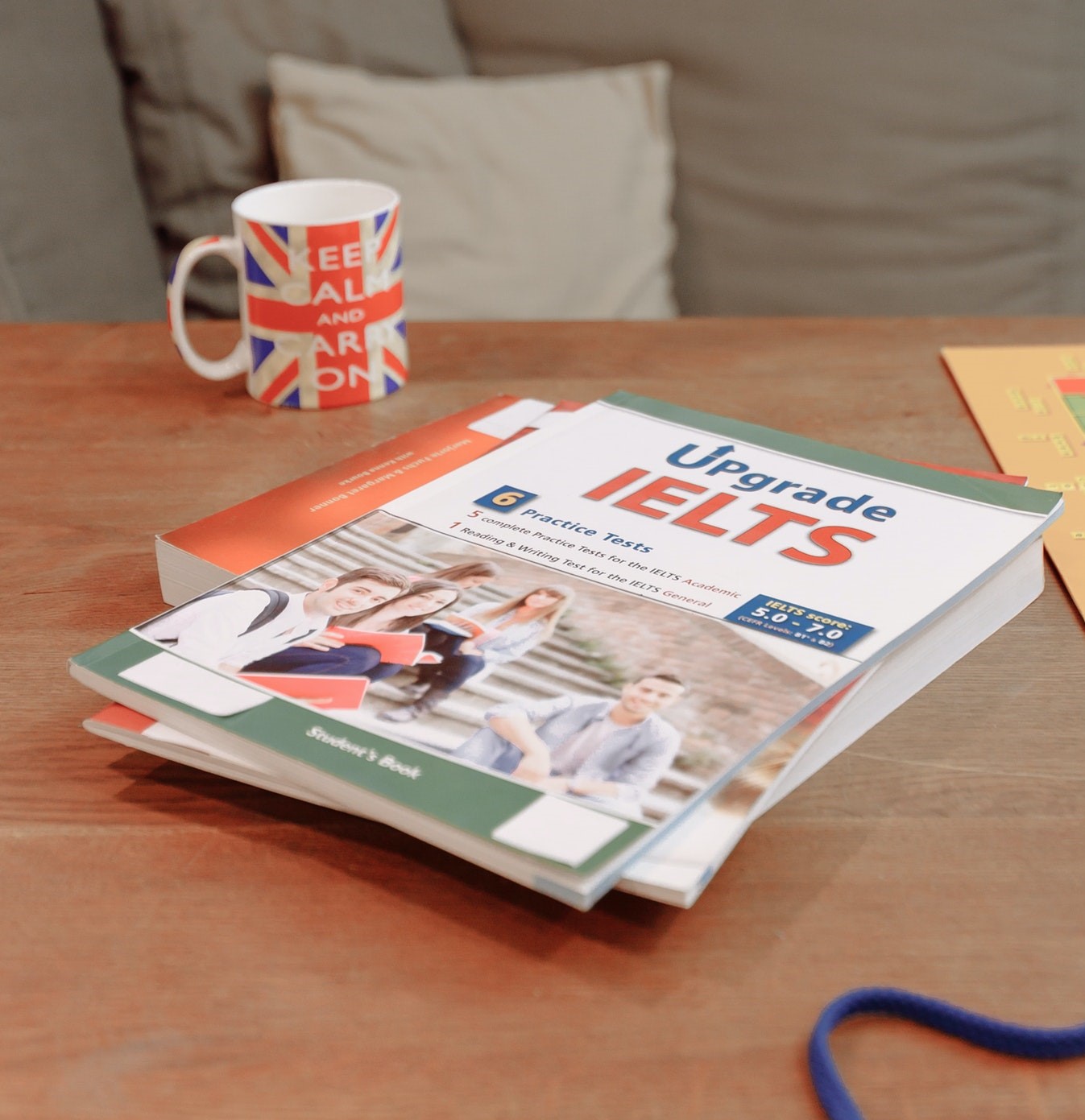How to Speak in Part 2
Get the IELTS score you need
Table of Contents

The topic card
So, you’ve completed Part 1 of the IELTS speaking exam, and it’s time to move on to Part 2. Of course, the examiner will inform you of this.
“Now I’m going to give you a topic card and, ask you to talk about it for one to two minutes.” You’ll have one minute before you speak to think about what you’re going to say, and you can make some notes on this piece of paper if you want.
When the examiner hands you the topic card, carefully examine it and, above all, take note of the grammar required for each of the questions on the card. Some topics will necessitate the use of more than one tense, which is important to remember when speaking.
Prepare for any topic, and don’t waste time worrying that you were given a difficult or irrelevant topic.
All of the topics are broad enough for any candidate to discuss in depth. If you get a topic that is related to something you are not interested in, you can use your imagination to make up a storey if necessary. The examiner doesn’t care if it’s true or not because they’re only here to test your English ability.
If you don’t understand something on the topic card, don’t hesitate to ask the examiner before it’s your turn to speak.
After your one minute is up, the examiner will tell you that you can now begin discussing your topic and will notify you when your time is up. You should speak for 1.5 to 2 minutes. You can, of course, look at the topic card and your notes to help you speak, but try to make eye contact with the examiner as well, and don’t always have your head down. If you continue to speak after 2 minutes, the examiner will most likely stop you because they must be mindful of the time, and the examiner stopping you is nothing to be concerned about.
After you finish speaking, the examiner may ask you one or two quick follow-up questions about what you said, or he or she may simply move on to part 3. If you are asked any follow-up questions, you only need to give a brief response.
Part 2 is not a speech!
Learning, and understanding how to speak in part 2 is a very important part of the IELTS speaking exam. Part 2 is definitely not a speech, and should be like giving a short story in any natural conversation situation. So don’t memorise an answer, word-for-word. If the examiner realises that your answer is memorized, you will lose points!
A lot of students make this mistake, and start reciting a topic like they would do in high school, which is always a very bad idea, and not how to speak in part 2. When you are preparing, and you are looking at example IELTS speaking answers on a website, video, or in a book, remember that these example answers are not natural, and more importantly, they are not your answers. If you recite topics in the exam, your score will certainly be lower, so keep it all natural.
When you start to talk about your topic, it’s best to just go straight into it like in a normal conversation. Do not start your topic as if you were going to start a speech, as not only does it sound terrible, but the examiner will not be impressed.
Describe a city you would like to visit.
I would love to visit Venice…
Do not, for example, say something like, “When I think of a city i would like to visit…
Do not, for example, say, “I am going to talk about a city. I would….
Keep it natural, like in a real conversation is a key point in how to speak in part 2.
Listen to some example part 2 answers:
Understanding the topic card (How to speak in part 2)
Describe a famous person who you think is interesting.
You should say
- Who this person is.
- How you first knew of this person
- What this person has done
And explain why you think this person is interesting
When most IELTS students look at a topic title like this, the first thing they see is “famous person,” and they miss out on a very important key word, usually an adjective.
The topic above is not to describe a famous person, but rather to describe a famous person you find interesting. The topic card’s final question will ask you to explain why you think this person is interesting. Almost every topic will have a key word or adjective like this in the title, and it’s critical to remember it and use it when you speak. I would advise you to repeat this key word up to 5 or 6 times as you speak. It will not only help you stay on topic, but it will also make it appear less like you just prepared a speech about a famous person.
Sometimes students ask if they have to answer all of the questions on the topic card, and I would say yes, because it keeps you on topic and makes it easier for the examiner. Having said that, try to answer the questions in a natural manner, and avoid sounding like you’re only answering 4 or 5 questions. Try to keep your topic like a short story. The final question on the card will always be, “Explain why, how, or what,” and it is critical to answer this question.
Decide what to talk about
After reviewing your topic card and noting any necessary grammar and key words, it is time to quickly decide what you will discuss. Because you only have one minute to prepare, it is not a good idea to spend too much time thinking about this, as you will run out of time and your score will suffer as a result.
If you are given a topic for which you cannot think of an experience to discuss, you will have to use your imagination to make up a portion of it. For instance, your topic could be to describe an older person you admire. Perhaps you can’t think of an older person you admire, but you almost certainly know one, so make up some reasons why you admire this person. I would only do this if absolutely necessary, because it is always easier to speak the truth.
Another thing to consider when deciding what to talk about is whether you will have enough to say about your chosen topic. Do you have the vocabulary or lexical resources to discuss it? I’ve seen students make poor decisions here and end up unable to discuss their choices. This is something to keep in mind while studying for the exam and reviewing all of the current part 2 topics.
Always try to make your topic personal and express your emotions and feelings when speaking about it. For example, if your topic is to describe a famous person, choose someone you really like or admire and try to reflect that in your speech.
Extending your talk
When I talk to students, one of the first things they ask me is, “How do I speak for longer in Part 2?” One way to begin is to consider all of the question words: what? who? where? when? how? and why?
Describe a place you would like to visit.
- You should say
- Where would you like to visit?
- How would you go there?
- When would you go ?
And explain why you would like to visit this place
Here we can see the questions, where? how? when? and why?
How would you go there?
I would go there by train.
Now let’s add a why?
I’d take the train because it’s a long distance from my house, but the high-speed train can get there in just over 2 hours. The train is also very comfortable and much less expensive than flying. I could also enjoy a lot of beautiful scenery along the way, as the train passes through some very beautiful mountains, so I believe taking the train would be the best way to get there.
Now you can see how I took my key word and expanded it into a paragraph, with some interesting details, by just adding a simple, why.
When would you go?
I would go in the Summer.
Now let’s add the why?
I’d go there in the summer because I have a long summer break from university and, of course, the weather is ideal for visiting this location in the summer. Another reason is that my best friend is also free during the summer vacation, so we could go on the trip together, which would be fantastic.
If you stop, don’t panic, as there are some things you can do to help you.
- Use pausing or stalling phrases and language. “Let me think, what more can I say about that….well, another thing I remember is……
- Try not to use fillers such as um,er,eh as these have no meaning and are not actually English words. This will also show the examiner that you are having difficulties with your fluency, and lead to a lower band score.
- If the examiner asks if you have anything more to say, it’s always best to say yes, and try to continue talking.
- Try to think logically. ‘Well let me think….Let me see…. Another thing I remember is…..It was so long ago, but….
- A useful tip to extend on the last question is to make comparisons and add an example.
“Another reason I really enjoyed this town is that it is much quieter and more peaceful than my hometown, which has become busier and busier in recent years. I absolutely hate all the traffic and noise, so it was so enjoyable to get away from it for a few days.”
“Another great thing about this movie is that the plot was so much better than most other recent movies. So many movies today are all about the special effects or action, and don’t have an intelligent plot.”
This, of course, takes practise, and don’t expect to be able to do it on the day of the exam. Extending and discussing details in depth is something I always work on with students, and it takes practise.
Speed- Speak at a normal rate, not too fast and not too slow.
Part 2 takes a lot of practice to get right, and it’s very important for you to practice as much as possible before your exam, and you learn how to speak in part 2. On the day of the exam many candidates are nervous and actually start speaking too quickly, and then stop speaking with nothing to say after only 1 minute or so. The examiner is now looking at their timer, and waiting for the candidate to keep talking. The examiner will also probably ask you if you have anything more to say, which is making it very clear that you should keep talking on the topic. This is where you need to show the examiner that you can talk at length on any given topic.
Start talking at a nice steady pace, not too fast, and not too slow, keeping everything natural. Try to breathe in between your sentences, using stress and intonation as you speak. Try to smile sometimes, which will also help you with pronunciation as well as sounding more natural.
These are of course just some ideas for you to think about, and practice for part 2, and remember you can always book a class with us to further improve your IELTS score.
More on how to speak in part 2




















